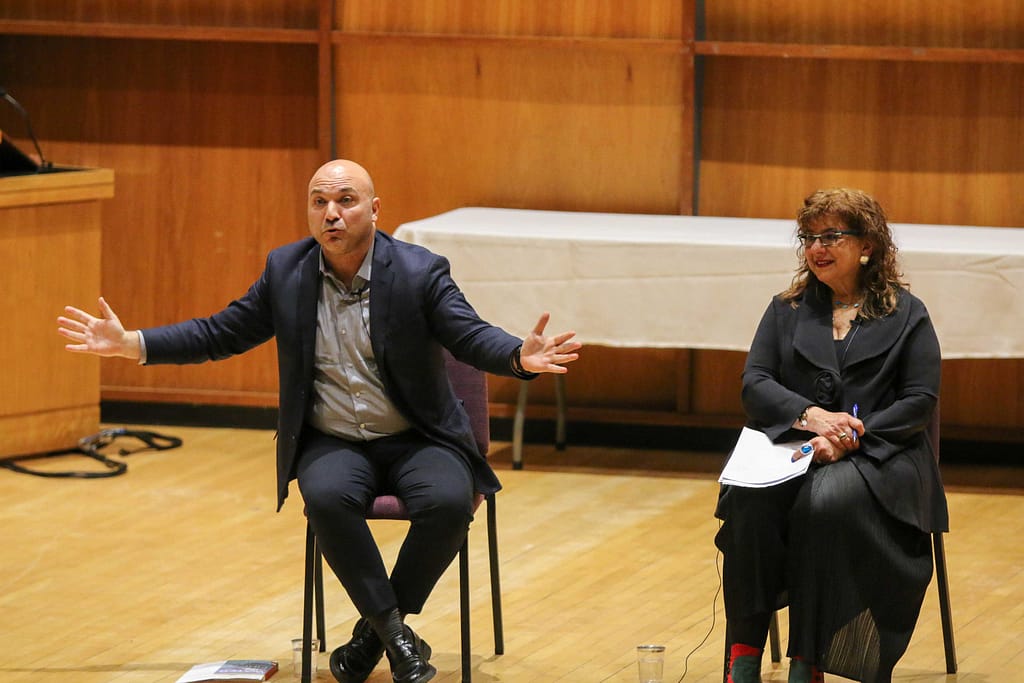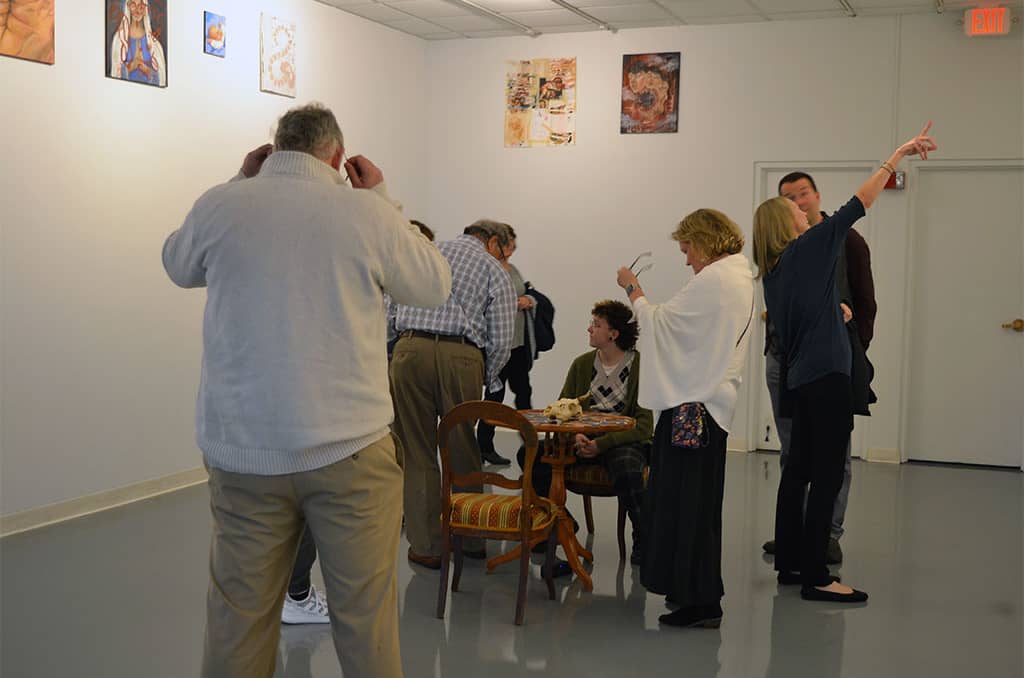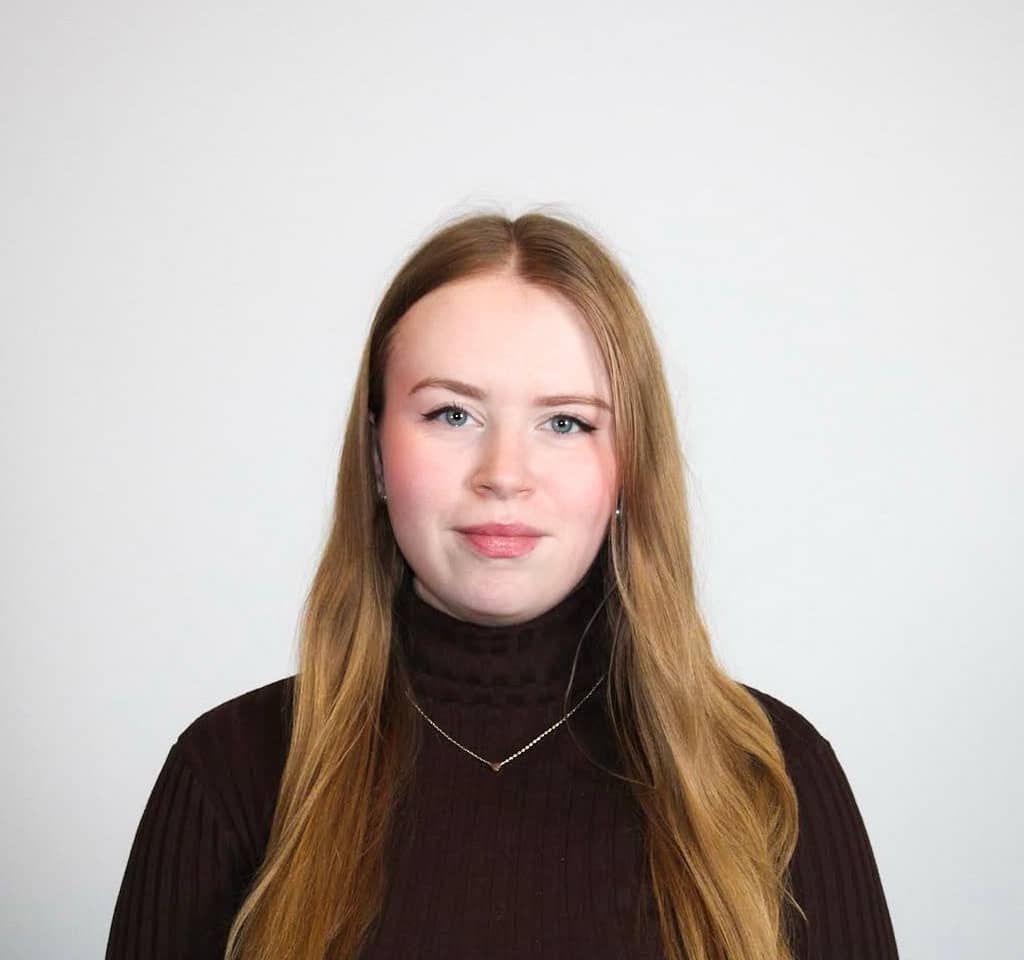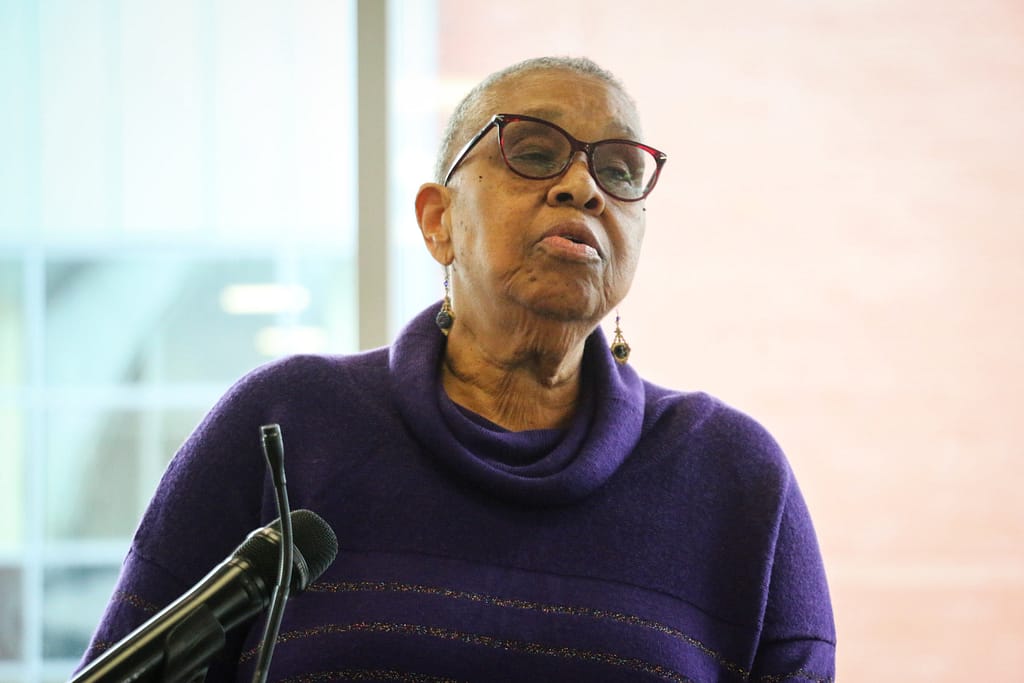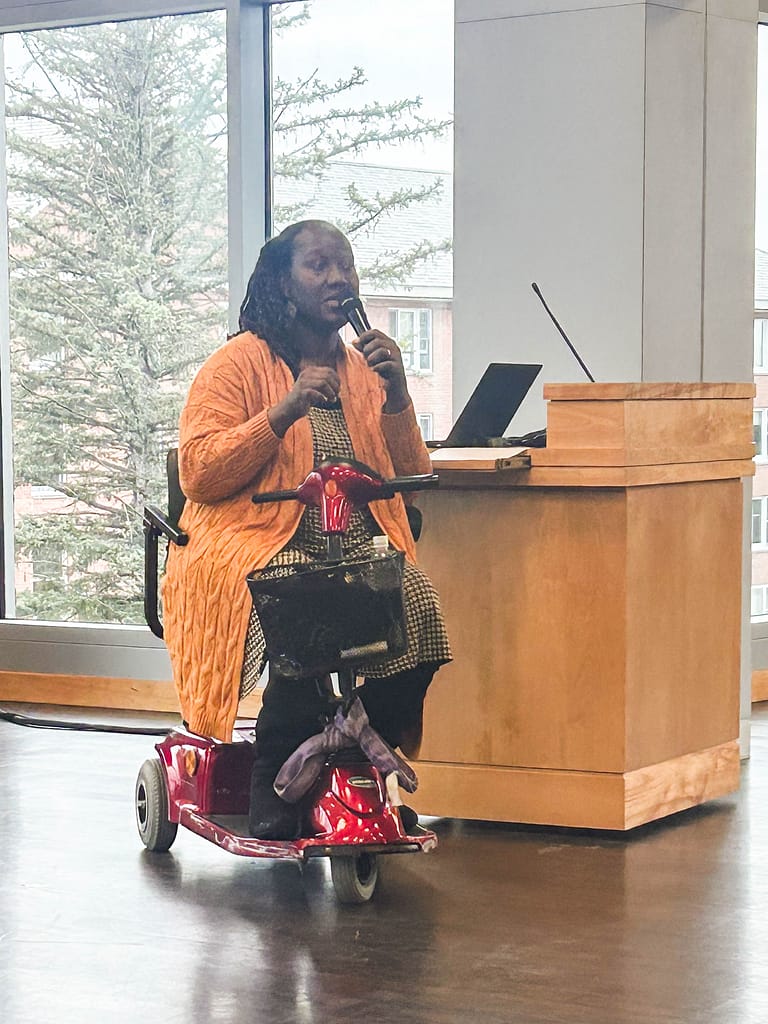Symposium sampler: Student writers take in a range of presentations
Friday and Saturday sessions included talks in mathematics/statistics, Spanish, English and on Health Equity graduate certificate topics -- and much more
Interesting student presentations continued Friday and Saturday (April 22-23) as Saint Michael’s College welcomed back its annual Academic Symposium after a two-year pandemic hiatus. Students of all disciplines and graduation years, including graduate program/certificate students, gave oral presentations across campus on the research projects that they have conducted during this academic year.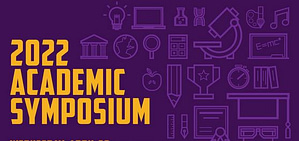
The Symposium had kicked off with Wednesday’s Media Studies, Journalism & Digital Arts seniors on April 20, followed by Thursday poster presentations from history students of Professor Kathryn Dungy, all in the Dion Family Student Center. (Read earlier report).
On Friday and Saturday, the majority of presentations in mostly Jeanmarie, St. Edmund’s and Cheray Hall classrooms were by graduating seniors, with a few presentations also given by juniors. The goal was to present the students’ findings to a group of mostly faculty and peers, with the potential for visiting family members to join as well. A few presentations were even recorded or live-streamed to allow greater access to the events.
To get a sample of the presentations that were offered, Marketing and Communications student-writer Beth Syverson ‘23 attended presentations on Friday from the Mathematics and Statistics, Spanish, and English departments. Here are Beth’s summaries of a few of these presentations:
In the Mathematics and Statistics Department, Paige Fleming ‘22 gave a presentation titled, “Neural Networks: Explanation and an Example,” which explored the creation and potential of artificial neural networks.
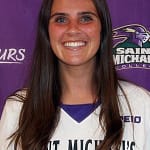
Paige Fleming ’22
To begin, she explained that artificial neural networks are created through mimicking human biological neural networks. In order to create these (a process which according to Fleming gets extremely complicated and extensive, extremely quickly) they use “deep learning,” a term which refers to helping computers to emulate the human brain. In modern technology, neural networks are used in unstructured data such as facial recognition and driverless cars in addition to structured data such as language translation technologies. Through her research, Fleming hoped to discover the capabilities of computers, even creating her own simple neural network as part of the process.
In the Spanish Department, Kaitlyn Paszkiewicz ‘22 spoke on the depoliticization of early languages in translation in her presentation titled, “La despolitización del lenguaje antiguo en una traducción contemporánea de ‘La Gitanilla’ de Cervantes.” Additionally, it is important to note that Paszkiewicz and other presenters in the department shared their work entirely in Spanish.
As a Spanish and English double major, Paszkiewicz, said, she has always been interested in the effects and connotations of language. For this reason, she attempted to translate the novela “La Gitanilla” (“The Little Gypsy Girl”) by Miguel de Cervantes. In Spanish, “gitanilla” or “gitana” are not considered to be slurs or politically incorrect, unlike their translation (“gypsy”) in English. After extensive searching and research, Paszkiewicz ultimately decided to use the Spanish word “romano” in her English translation because she could never find “the perfect word” in English, although she noted that she will never stop searching for it. Additionally, she stated that translating “old Spanish” (as “La Gitanilla” was published in 1613) helped increase her understanding of the language exponentially.
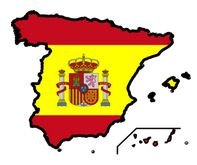
In the English Department, Sheila Caputo ‘22 gave her presentation titled, “Coping with Existential Crises in Invisible Man.” Through her presentation she outlined “anchoring,” “isolation,” and “sublimation” as coping mechanisms for the existential crises of the narrator in Invisible Man by Ralph Ellison. First, she stated the narrator demonstrates anchoring through his attachment to the Brotherhood, a group of men of the same race who desire equality in the white world. Ultimately, however, he realizes the faults of the Brotherhood and moves on. Next Caputo explored isolation particularly through the prologue and the epilogue of Invisible Man. Through this coping mechanism the narrator comes to the conclusion that society does not care about him and that therefore he is completely alone in the world. Lastly she outlined sublimation (which she jokingly referred to as “the healthy one”) where the narrator finally realizes that no one can help him so he must instead help himself. Through this the narrator enters a state of authenticity after realizing that anchoring and isolation do not do any good. Instead, he embraces his status of invisibility and can finally live his life authentically.
Spotlight on Health Equity (report from Kaylee Sayers ’23)
Amanda Rohdenburg ’11 (graduate certificate ’22) presented her capstone research project “Be Gay, Do Camp: Creating Communities where LGBTQ+ Youth Thrive” for the Academic Symposium on Friday afternoon. Her presentation was about the importance of granting queer youth an open and affirming place to validate their identities – a place, she said, such as Outright Vermont’s summer camp. With the completion of her research, Rohdenburg becomes the first and only graduate this year of the College’s new Health Equity Certificate Graduate program.

Amanda Rohdenburg ’11 (certificate ’22)
The annual Academic Symposium at Saint Michael’ is a multi-day showcase when both graduate and undergraduate seniors present their research/theses to the Saint Michael’s community. Students and professors take time out of their day to listen to the presentations and support their peers and students.
Rohdenburg graduated from Saint Michael’s College in 2011 with a bachelor’s degree in political science and gender studies and returned for the graduate Health Equity Certificate program, which is available to undergraduate students who have the credentials to take such classes. She is now the associate director of Outright Vermont, a LGBTQ youth summer camp. Ideal for such students already in the workforce, the Saint Michael’s College Health Equity Graduate Certificate is an online “asynchronous” educational opportunity for career professionals, college graduates contemplating further graduate study and community members interested in the timely and urgent challenge of health equity.
Rohdenburg’s “Be Gay, Do Camp” presentation showed data on how creating a space where LGBTQ+ youth can be “validated and affirmed” significantly reduced suicide planning in LGBTQ+ youth. “Summer camp is such a unique place,” Rohdenburg said, continuing to quote Kayla Weissbuch of Camp Brave Trails: “There are lots of places to be sad about being LGBTQ… and there weren’t a lot of places to experience queer joy outside of adult spaces, such as Pride.” LGBTQ youth camps allow for freedom of expectation and a non-heteronormative camp culture that is not oppressive in terms of gender expression, she said..
Outright Vermont is a “traditional summer camp experience with a queer twist,” according to Rohdenburg’s presentation. Outright Vermont creates an inclusive environment for queer youth to affirm their sexuality and gender identity. “For a lot of youth, meeting a queer adult for the first time was really impactful,” Rohdenburg said, adding that camp counselors saw “amazing changes in young people” and that they “became more rooted in their own sense of self” during their time at Outright Vermont. Faculty adviser Trish Siplon explains that Outright Vermont is a nongovernmental organization serving the LGBTQ+ youth of Vermont, and Camp Outright is one of many programs that Outright Vermont runs.
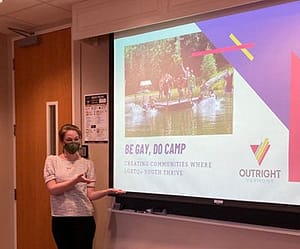
Amanda presents on Friday. (photo Trish Siplon)
Rohdenburg was aware that attendees of Outright Vermont likely had some semblance of support in their home or community through being able to attend an LGBTQ summer camp, so she concluded her presentation with the insight that LGBTQ youth who might not have access to queer summer camps should still be exposed to a supportive environment. Other summer camps that are not directly geared toward LGBTQ youth should still have representative counselors and more egalitarian gender expectations that are not oppressively heteronormative, she said.
Jeson Li ’23 followed Rohdenburg’s presentation with his own exhibition from his summer research internship. His presentation, titled, “No Free Lunch: Who is Paying for Vermont’s Medicaid Reform?” talked about HCAR 6.100.2 and how Vermont pharmacies pay the price for unpaid prescriptions. He worked on his research over the summer with Professor Patricia Siplon in the Political Science Department. Li is taking a few of the health equity graduate courses during his time as an undergraduate since some graduate courses are available to undergrad students with the right criteria.
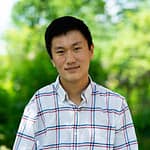
Jeson Li ’23
Green Mountain Care is Vermont’s Medicaid program, and it has no premium or deductible, and the copay for prescription medication caps at three dollars. Due to the Social Security Act ensuring that people have a right to their prescription medication, Vermont adopted HCAR 6.100.2 which covers the copay of prescription medication if the person picking it up cannot pay.
To Li’s knowledge, pharmacies do not tend to advertise HCAR 6.100.2. Li shared that there’s “no free lunch,” and brings up the question of who the actual cost of the copay falls upon. The pharmacies themselves end up eating the owed money because there is no way to force the payment of the copay. Li shared how the pharmacists whom he interviewed were willing to help people in need “to an extent,” but especially when it comes to family-owned, independent pharmacies, “it’s still a business.”
“There needs to be a better balance,” Li concluded.
Read the full list of Academic Symposium presentation titles here>>
